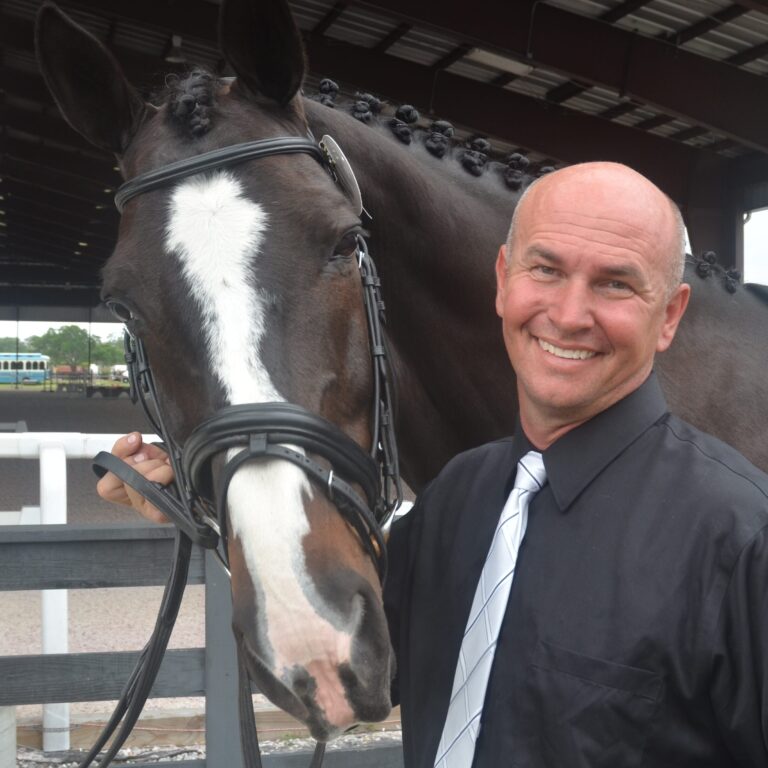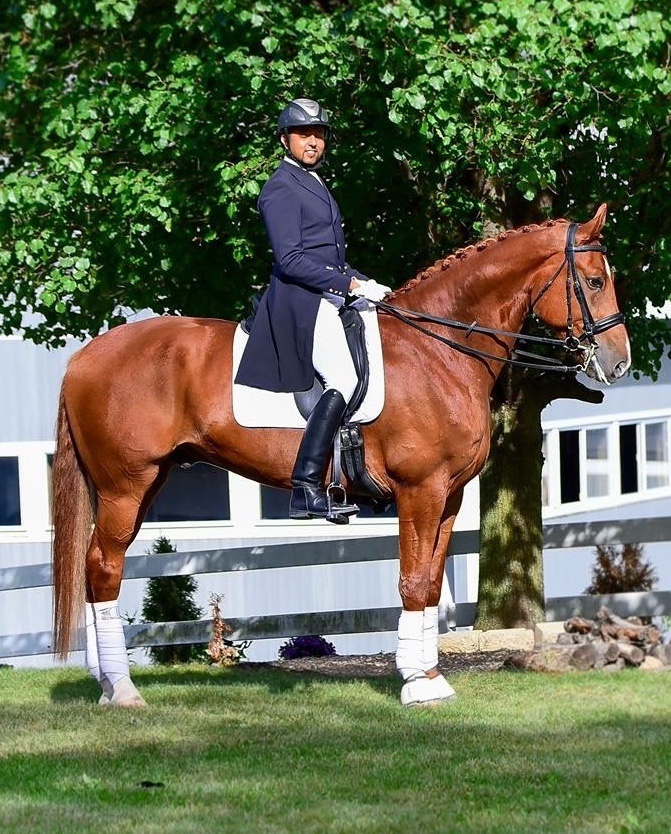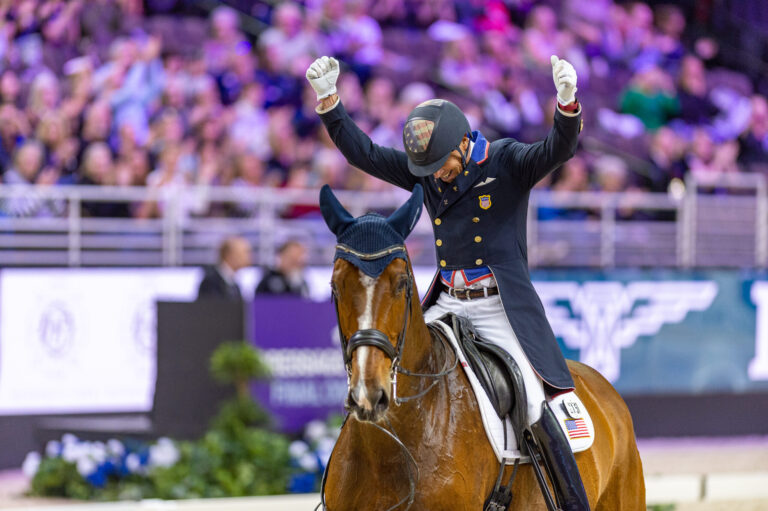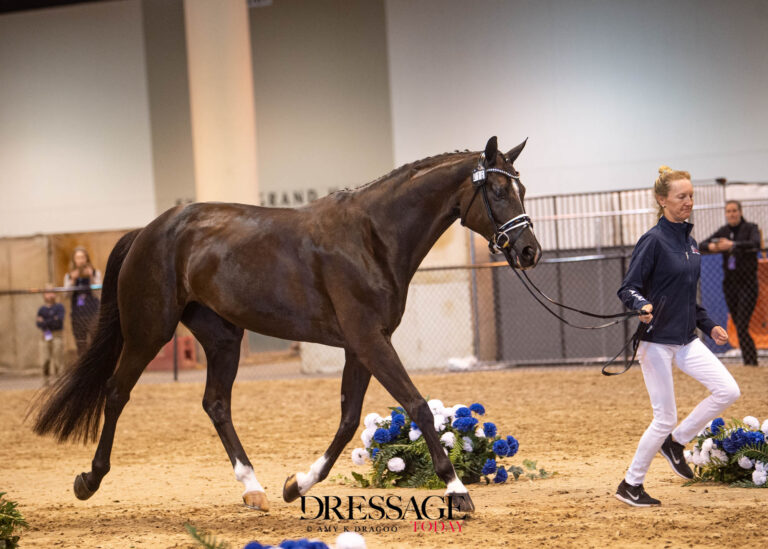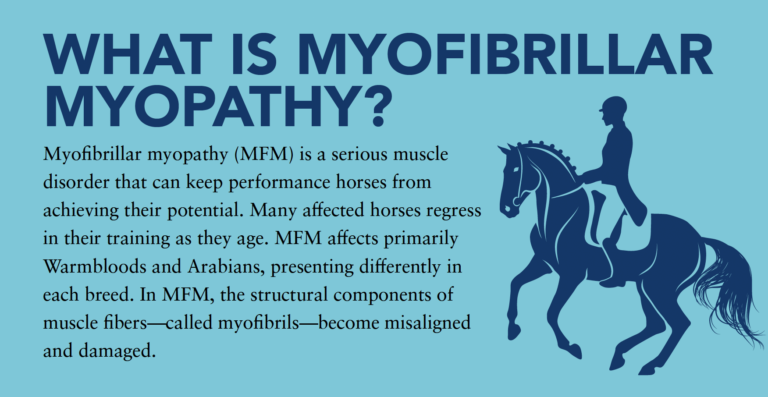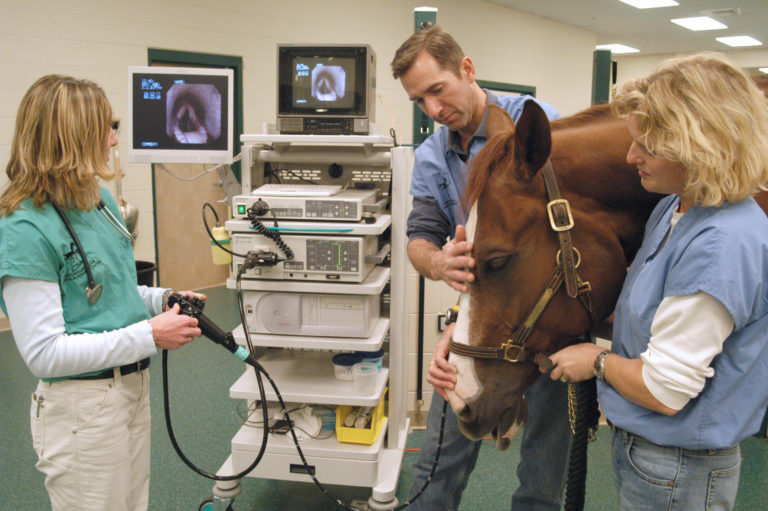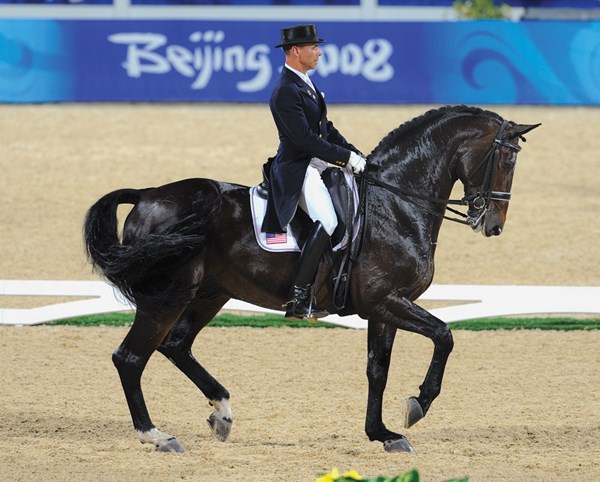
On April 27, 2013 Ravel, the most successful dressage horse in U.S. history, officially retired from international competition in a special ceremony at the Del Mar National Horse Show in California. Ravel’s achievements place him among the world’s greatest in an era that has seen the sport soar to new heights. He has carried Steffen Peters to a World Cup Final title, swept the CHIO Aachen, won the only individual World Equestrian Games (WEG) dressage medals for the United States and has come closer to an individual Olympic dressage medal than any American horse since 1932.
At 15, Ravel may seem young for retirement but his journey is far from over. His owner, Akiko Yamazaki, is enjoying a fitting reward in the saddle for her support of Ravel and Steffen over the past seven years. “We really felt [retiring Ravel] was the right thing to do,” says Steffen. “We all know horses don’t last forever. We wanted him to go out as a fresh, sound champion. And I think that’s what we did.” As his life story attests, Ravel has more than earned the retirement bestowed on him.
The Delinquent
When Steffen found Ravel in 2006, he was an 8-year-old Dutch Warmblood stallion (by Contango) with a giant talent and the personality to match. The long search for Steffen’s next Olympic prospect had been joined by Akiko and her husband, Jerry Yang, who believed the rider was destined for greatness with the right horse and support. Bred by H. de Mann, Ravel had been trained to the small-tour level by Dutch Olympian Edward Gal. The horse impressed Steffen immediately at owner Tim Cooman’s farm. “Even in the warm-up he showed this beautiful trot,” remembers Steffen. “My heart rate was way up there in the first seconds.” A few trial rides confirmed to Steffen that he had found the horse he had been looking for.
Within weeks, Ravel was in quarantine in California, where the extent of his stallion character began to emerge, and Steffen struggled with the horse’s behavior. Screaming, distracted and difficult to handle, Ravel eventually sealed his own fate. “One day he made a beeline for another horse and that was it,” Akiko remembers. Ravel was gelded before he left quarantine, and his temperament was transformed within weeks. Over the following months, Steffen established a bond with his new partner, and the dream of the 2008 Olympics began to appear within reach.
Ravel’s Grand Prix debut was scheduled for the spring of 2007, but just before that competition, Steffen felt Ravel was not quite right. His veterinarian, Dr. Rodrigo Vazquez, diagnosed an injury to the right front leg. It was not just a minor strain. There was no guarantee that Ravel would return to a sport career at all, never mind the 2008 Olympics. “I was completely devastated,” says Steffen.
The Honor Student
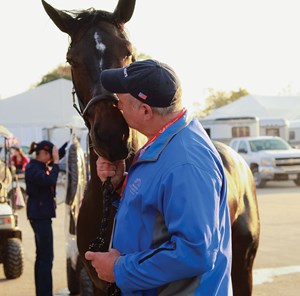
In the spring of 2008, after many months of careful rehabilitation, Ravel was declared recovered by Dr. Vazquez and able to return to work. His first Grand Prix competition was at the U.S. Olympic selection trials, where he stunned everyone by winning. Rafael Hernandez, Ravel’s groom at the time, remembers sharing tears of joy with Akiko. “I said to her, ‘This horse is paying us back for all the time he was resting.’” By the time the 2008 team was named, Ravel was the leading horse. In what was a truly meteoric rise for the now 10-year-old gelding, the Grand Prix test in Hong Kong would be his first appearance in an international competition at that level.
Ravel’s fast-tracked education continued at the Olympics, where he finished 10th in the Grand Prix. Horses aren’t expected to develop in their training at an actual competition, but that is what seems to have been the case for Ravel in Hong Kong. When the Grand Prix Special was over, Steffen and Ravel had shot up to fourth place. What had been unimaginable even a day before—a shot at the podium—was suddenly possible. Steffen held nothing back in the Freestyle, and his risk-taking paid off. Ravel earned a score of 76.5 percent, which put him third. His combined score put him fourth, just 0.305 percent away from a bronze medal. It was the most rewarding fourth place Steffen had ever earned. “For a horse to make his international debut at the Olympic Games and place fourth is incredible,” he remembers.
The Graduate
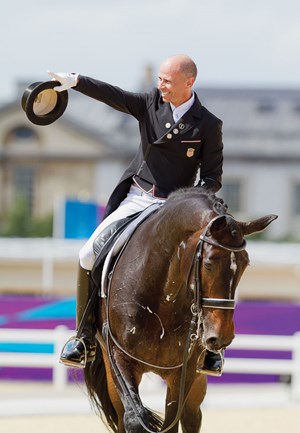
In 2009, Ravel proved he was no flash in the pan. At the World Cup Final in Las Vegas, he made history by becoming only the second American horse, and the first on home soil, to win the title. “I would have to say the World Cup Final was my most exciting moment with Ravel,” says Steffen. “I think every rider will always remember the very first win at a big championship.”
Las Vegas also stands out for Akiko, who has never missed a single time her horse has cantered down centerline at an international event. But it was the Grand Prix and not the actual Freestyle win that stands out most vividly in her memory. “Even now, thinking about it kind of gives me the chills,” she says. “Other horses were coming into the arena and needing to get used to the atmosphere. Ravel just owned the place. He so dominated that show in the Grand Prix.”
Ravel’s domination continued into the Freestyle, where Steffen says he will never forget seeing his score come up on the scoreboard while thousands of home-crowd fans cheered ecstatically. “All I saw was number one, not the score. I remember standing up in the stirrups and throwing my arms up, while Ravel stayed totally calm. It’s a bit surreal, a moment like that.”
Ravel’s arrival at the top continued into that summer when his name topped the leaderboard in all three classes at the world’s most prestigious annual competition, the CHIO Aachen in Germany. His competition schedule then quieted down over the next year in preparation for the 2010 WEG. “Steffen has never done a whole lot of competing that wasn’t necessary,” says Akiko. “It’s one of the things I really appreciate about him. He does a great job in choosing the right competitions to go to. Ravel didn’t need to show and show. He could go from four months away and just pull it off.” She says it was around that time that she started to understand her responsibility as owner of a horse like Ravel. “Being a new sponsor at that level, I hadn’t really thought about what it means,” she says. “When, in 2009, he became one of the top horses in the world, the pressure of owning such a horse became much larger.”
Steffen showed Ravel lightly in the months leading up to the WEG in Kentucky. The wisdom of his strategy was never in question after Ravel won an individual bronze medal in the Grand Prix Special then followed that with a second bronze in the Freestyle. “The Grand Prix Special was another memorable moment for me,” says Steffen.
The years 2011 and 2012 were punctuated by back-to-back wins at the World Dressage Masters Palm Beach in Florida. Once again, Steffen carefully chose his competitions and was exempt from having to participate in the 2012
Olympic selection trials. However, London did not turn out the way Steffen or Ravel’s supporters had hoped. Spooks in the Grand Prix Special and the Freestyle interrupted the usual harmony and seamless flow that had become the trademarks of Ravel’s performances. “He always comes across so calm in the arena but he can be quite spooky,” says Steffen. “I could always feel it a little when a spook was coming but thanks to his elasticity I could cover it up.”
There is no denying that Ravel retired as one of the most successful dressage horses in the world. Steffen has had a small ritual he performed at every major competition. “I always send Akiko a little e-mail asking her to reflect a little bit. The bottom line of my message is always ‘Akiko, thank you for my dream.’”
The Professor
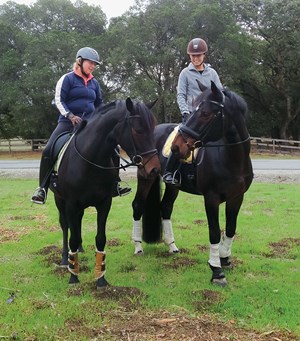
Life for Ravel these days involves a combination of schooling in the ring and relaxing rides in the woods with Akiko aboard. Steffen keeps a watchful eye on the pair with regular lessons. “I ride him once a month at least,” he says. “It is amazing that after not riding him for a month, I feel like I could still go in the Grand Prix arena the next day. I give Akiko an A-plus for her homework and an A-plus for Ravel as well to be willing to continue working as he always has.”
Akiko says, “I’ve always admired Steffen as a rider and trainer, and now that I’m riding a product of his, I have even more admiration for the type of rider he is. The horse is incredible himself, but I can feel how precisely he has been trained—very equal left and right, very correct. You could not ask for a better schoolmaster.”
Akiko has not yielded to pressure from family and friends to compete Ravel. “I feel that would not be fair to him. He has been such a great horse and he should remain like that in people’s eyes. He just loves the trails.”
Ravel’s body of work represents far more than just the efforts of a horse and rider and the financial support of his owners. “You cannot take a horse to the level that we have done with Ravel without a team,” says Akiko. From the grooms to the veterinarians to equine physical therapist Tom Meyers to Shannon Peters, Steffen’s wife and indispensable eyes on the ground, the successes have been earned and enjoyed by a small army.
As Steffen moves on in his career with Ravel’s talented successor, Legolas 92, he takes with him many irreplaceable memories. “I don’t think I will ever ride another horse that is as supple as Ravel, and on top of that he has three outstanding gaits and a canter that is simply phenomenal,” he says. As talented as he was in the canter tour and in the piaffe/passage, Ravel will be remembered by many for his outstanding trot half passes, which always looked perfectly effortless. “I didn’t do them very often, mainly in the show ring,” says Steffen. “But the days I got to do those half passes, that’s a feeling you never forget.” As Steffen said following his final performance with Ravel in London, “He owes us nothing. We owe him everything.”


